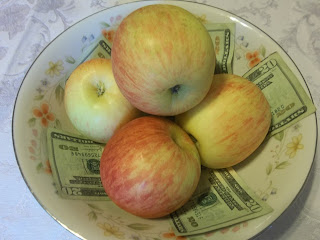Kids,
Last time I said you needed to learn to see the world as Giants see it. Who are "Giants"? We are going to focus on the super producers of the world but it also includes the central banks. What do Giants see when they look out across the landscape? More important to me, what did their fathers see? Do they see ants? Do they see the fruits of their labor? Do they see time itself?
Perspective is different when one is so large. Your mother and I are careful about spending; working, for example, to keep our power bill to a minimum buy turning off lights. A Giant, who makes more money in a day than I make in a year, doesn't flinch when the power bill comes in. Those little bumps in the road are not even noticeable.
Similarly, a revaluation of gold will mean more to me than to a Giant. My few ounces represent, to us, future wealth purchased at current prices. Our gold is currently only a percentage of our current wealth. After the revaluation it may be all we have. In contrast, the Giant already has significant wealth. He is desperate to lock away some of his surplus production (currently represented by dollars) in a lasting form. Like us, it is in his best interest to buy as much gold as he can at the best price he can...but he's buying so much gold he can't afford to shop around. In fact, there is no "shop around" available to him.
We buy an ounce or two at a time from the local coin shop with a portion of our income. If the Giant went to the coin shop with a similar portion of his income he would quickly buy everything available and drive up the price for all buyers...including himself. His strategy has to be different. He can't buy at the coin shop. He has to buy gold in quantity, not at today's price, but at tomorrow's price...possibly the Freegold price. The Giant knows that a bird in the hand is worth two in the bush. He is willing to pay more per ounce because it's the only way he can lock away his wealth. We are at an advantage because we can just go buy what we want at today's price...knowing we will be wealthy later. Giants are wealthy now.
ANOTHER spelled this out quite clearly:
A wise oil nation can strike a deal with the paper printers and in doing so come out on top. Go back a few years to the early 90s. Oil is very high, you offer to lower the US$ price in return for X amount of gold purchasing power. You don't care what the current commodity price of gold is, your future generations will keep it as real wealth to replace the oil that is lost.The Giant can see further into the horizon. He sees what is coming from a long way off. If Giants are willing to get rid of dollars at any price and if we can see their footsteps...shouldn't we follow? Does the dollar price of gold really matter? Ants, like us, are very price sensitive but it is very important to just put some gold away for someday!
Kids, someday may arrive...and quite suddenly...like it did in 1934. Changes happen without warning like in 1971. When will Freegold arrive? Someday. Did we pay too much for what we have? You know, after a sudden revaluation of gold it won't matter what we paid. Do we have enough gold? We will never have enough gold...but we'll always have some and we will always work for more.
Giants buy at a premium to preserve wealth for generations. We can learn from this. There is more we can learn from Giants but that's enough for now.

